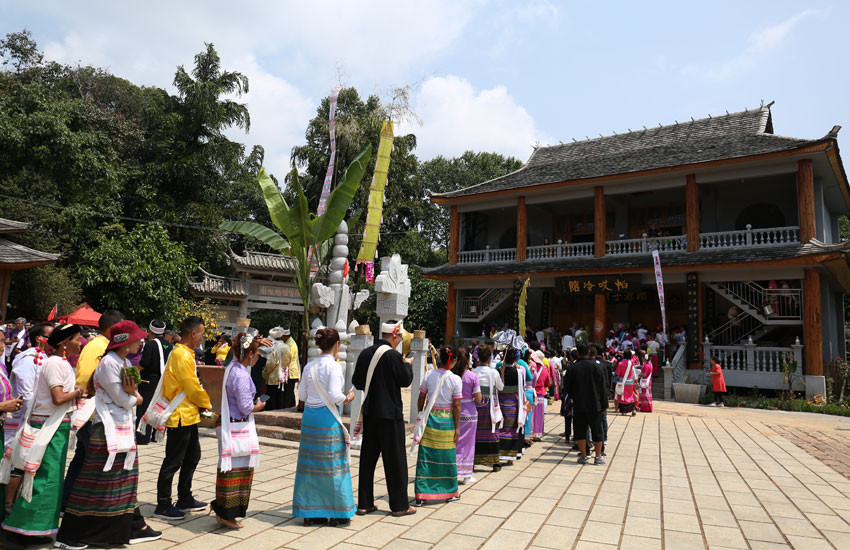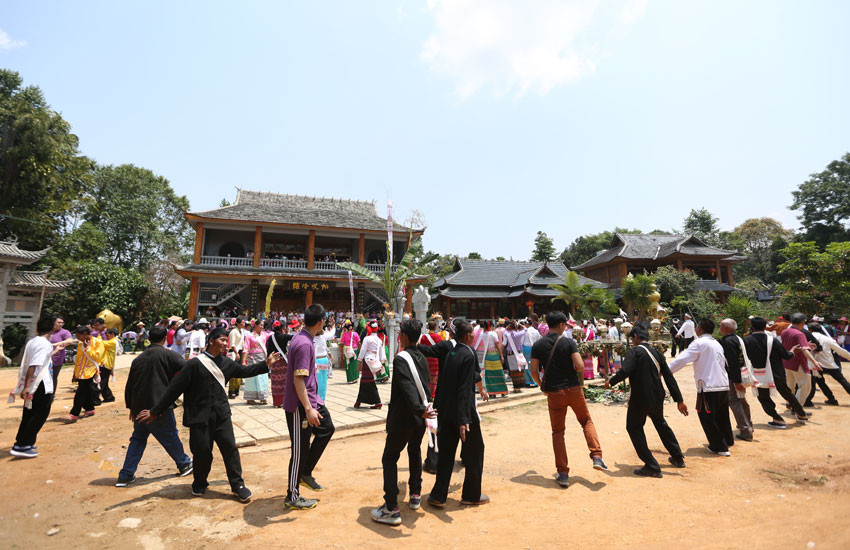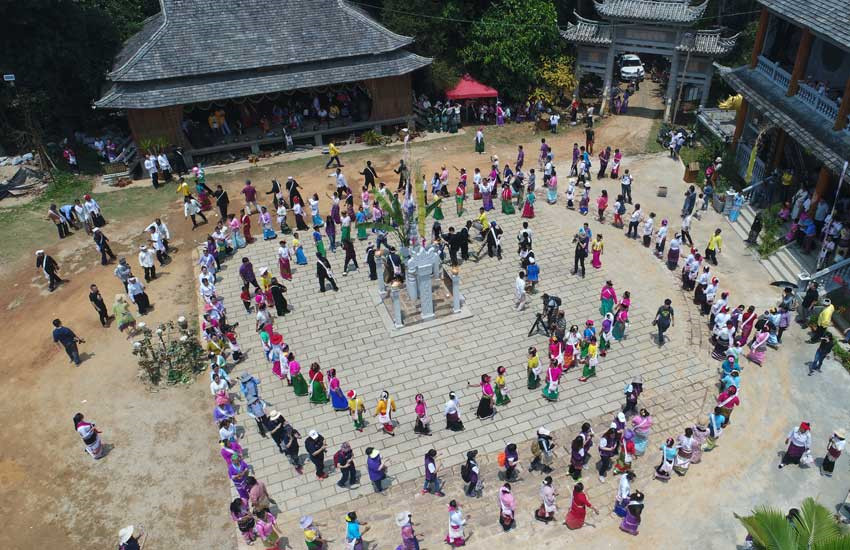
Worship of Tea Ancestor Festival of Bulang Ethnic Minority
Chinese Name:布朗族茶祖节
English Name: Worship of Tea Ancestor Festival of Bulang Ethnic Minority
The Tea Ancestor Festival is an important traditional festival among the Bulang ethnic minority, akin to the Han Chinese “Spring Festival.” It is generally celebrated annually, except during the Cultural Revolution when it was temporarily discontinued. The festival was revived starting in 1989 but initially without the grandeur it enjoys today. Traditionally, it spans four days, from April 13th to April 17th in the Gregorian calendar.
First Day: Preparation work includes tasks such as cutting bamboo for sacrificial purposes.
Second Day: “Receiving Seven Canals of Water.” A canal receives half a bucket of water, into which a stone is placed. The water received is mixed with herbs and used to wash the statues of Bodhisattvas and Ai Leng. Four respected elderly people perform the washing ritual, starting with the Bodhisattva statues, followed by Ai Leng, and finally the statue of the Seventh Princess.
Third Day: Every household prepares offerings, including rice, tea, cakes, money, and more.
Fourth Day: Worship of Ai Leng, Bodhisattvas, and the Seventh Princess. Afterwards, they go up the mountain to call upon the tea spirits (茶魂).
During the worship ceremony, women, especially elderly women, lead the procession. This is because women symbolize half of the sky and are also the primary tea pickers. Thus, they lead the worship procession, followed by men, women, and children of all ages.
While the elders chant scriptures, everyone lights candles. This practice has two significances: first, candles are closely associated with Southern Buddhism, which is integral to Bulang ethnic beliefs, and they are lit during significant events. Second, during the invocation of the tea spirits, using candles is a ritual in Bulang ancestor worship. It is believed that ancestors, including Ai Leng’s soul, can see and hear the worship offered to them only when candles are lit, signifying respect. If no candles are lit, it implies disrespect, as the ancestors cannot receive the offerings.
The essence of the Tea Ancestor Festival lies in honoring Ai Leng. Legend has it that after Ai Leng’s passing, his subordinates continued to worship him annually because he introduced tea cultivation and left it as a legacy to future generations. The purpose of calling upon him during the festival is to show him that his descendants have been preserving and managing the tea he left behind with great care, inviting him to partake in the offerings they present to him. Considering Ai Leng as the “Tea Ancestor,” the festival was officially named “Tea Ancestor Festival” after the founding of the People’s Republic of China.
The Tea Ancestor Festival is also a season for neighboring ethnic groups, relatives, and friends to visit and interact, fostering mutual understanding. Concurrently, it is a time for outings, leisure activities, and entertainment.

 7 Days GolfingTour
7 Days GolfingTour
 8 Days Group Tour
8 Days Group Tour
 8 Days Yunnan Tour
8 Days Yunnan Tour
 7 Days Shangri La Hiking
7 Days Shangri La Hiking
 11 Days Yunnan Tour
11 Days Yunnan Tour
 6 Days Yuanyang Terraces
6 Days Yuanyang Terraces
 11 Days Yunnan Tour
11 Days Yunnan Tour
 8 Days South Yunnan
8 Days South Yunnan
 7 Days Tea Tour
7 Days Tea Tour
 8 Days Muslim Tour
8 Days Muslim Tour
 12 Days Self-Driving
12 Days Self-Driving
 4 Days Haba Climbing
4 Days Haba Climbing
 Tiger Leaping Gorge
Tiger Leaping Gorge
 Stone Forest
Stone Forest
 Yunnan-Tibet
Yunnan-Tibet
 Hani Rice Terraces
Hani Rice Terraces
 Kunming
Kunming
 Lijiang
Lijiang
 Shangri-la
Shangri-la
 Dali
Dali
 XishuangBanna
XishuangBanna
 Honghe
Honghe
 Kunming
Kunming
 Lijiang
Lijiang
 Shangri-la
Shangri-la
 Yuanyang Rice Terraces
Yuanyang Rice Terraces
 Nujiang
Nujiang
 XishuangBanna
XishuangBanna
 Spring City Golf
Spring City Golf
 Snow Mountain Golf
Snow Mountain Golf
 Stone Mountain Golf
Stone Mountain Golf














